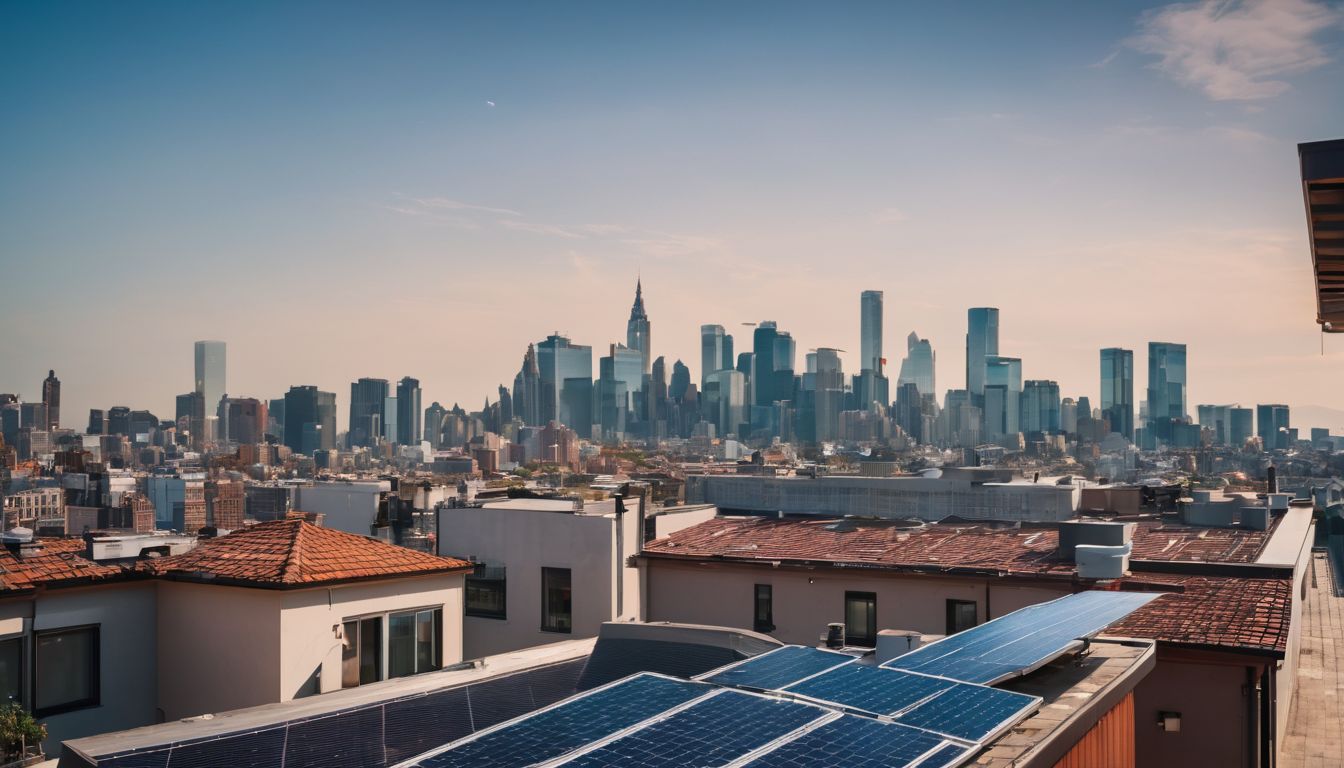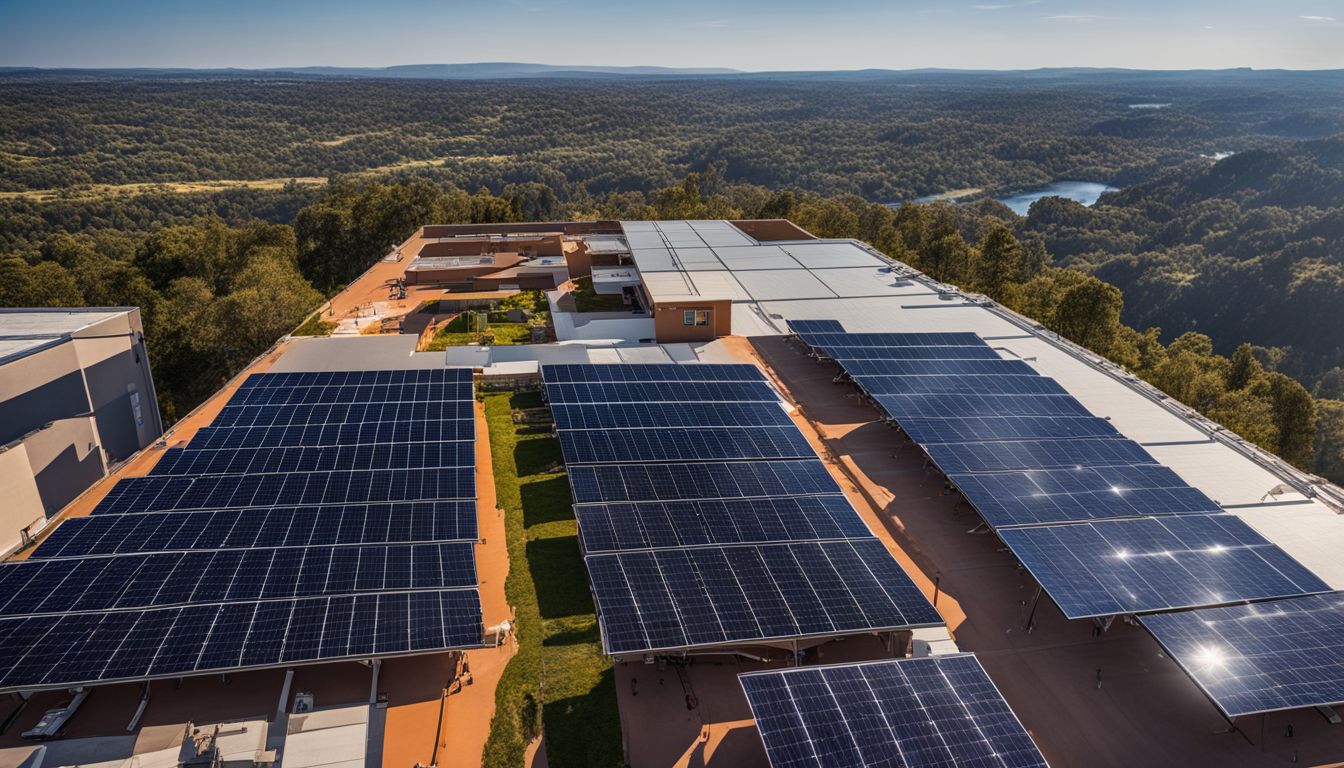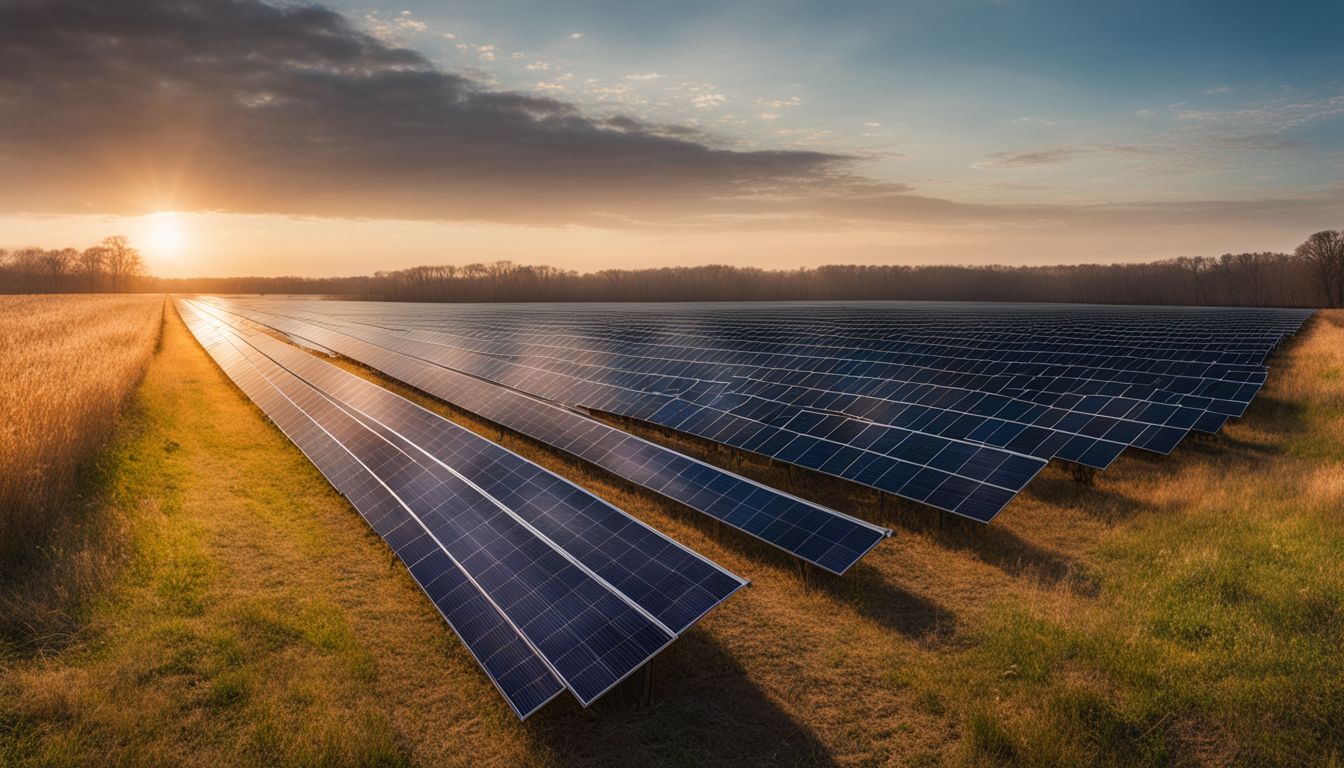How many solar panels does it take to run a house?

Deciding on the right number of solar panels for your home can be puzzling. Did you know that an average household might need around 20 panels to meet its energy needs? Our insightful guide is here to illuminate just how many solar panels it will take to power your living space effectively.
With simple calculations and expert advice, we'll help you harness the sun's energy with ease—read on for a bright start!
Key Takeaways
- You need to work out how much power your house uses to know how many solar panels you will need. This depends on things like the size of your home and how much energy you use.
- The sun's power in your place is also key. In places with more bright sunlight, you might need fewer panels than where there are more clouds or less daylight.
- Solar panel systems come in different wattages, commonly 250 to 400 watts. If a panel has a higher wattage, it can make more electricity, which may mean you need fewer panels.
- On average, a home in the UK might use about 30 kWh of electricity each day, but this can change based on many things, like house size and family habits.
- Homes can be fully powered by solar energy if they have enough good-quality panels and proper planning for when the sun isn't shining, such as at night or during cloudy weather.
The Basics of Solar Energy

Understanding solar panels is the key to harnessing solar energy for your home. Solar panels work by capturing sunlight and converting it into electricity, making them an essential component of a solar power system.
https://www.youtube.com/watch?v=_Fx0Sj26vLo
Understanding Solar Panels
Solar panels capture light from the sun and turn it into electricity. They are made up of many solar cells linked together to form a panel. These cells are special because they take sunlight and make clean energy we can use in our houses.
Each panel's power is measured in watts, and most home panels can make 250 to 400 watts every hour. To fully power an average house, you might need between 17 and 21 solar panels. This makes sure that all your lights, TVs, fridges, and other things get enough power from the sun's energy.
How Solar Panels Work
Solar panels turn sunshine into electricity. They have lots of small cells that take in light from the sun. When the light hits these cells, it makes electrons move, and this movement creates electric power.
The electricity they make can power your lights, fridge, TV, and other things in your house.
This process is very smart because it takes energy from the sun that does not cost anything and turns it into power we can use. It's a clean way to get energy, which means it doesn't pollute the air or harm our planet.
Many people like solar panels because once you set them up on your roof, they keep making electricity without needing extra stuff or making noise.
Determining the Number of Solar Panels Needed

To determine the number of solar panels needed to run a house, it's essential to calculate the kilowatt-hours required for your household and factor in the peak sun hours in your location.
Choosing the right solar panel power rating is also crucial in determining how many panels you'll need.
https://www.youtube.com/watch?v=pCoTa3sg_us
Calculating the Kilowatt-Hours Needed for Your House
To figure out how many kilowatt-hours your house needs, you need to know a few things. First, look at the total kWh you used in the last year. This number tells you how much energy your home consumes on average each month.
Say your house is 1,500 square feet; it might use around 630 kWh every month. If it's bigger, say 3,000 square feet, it could be about 1,200 kWh per month.
Your appliances play a big part too. Check their wattage and think about how long they run each day. A fridge chomps down more power than a light bulb does! Add up all those numbers to get the grand total of kWh you'll need for solar panels to cover your electric needs.
It's like putting together pieces of a puzzle; once you have this information, finding out how many solar panels are needed becomes clearer!
Factoring in Peak Sun Hours in Your Location
Peak sun hours are not the same everywhere. They change a lot, depending on where you live. In some places, the sun is very strong and shines for many hours each day. In other areas, it might be cloudy a lot or the days are shorter, so there's less sunlight.This matters because solar panels need sunlight to make electricity. More peak sun hours mean your panels can make more power. Before you get solar panels, find out how many peak sun hours you have in your area.
This will help you figure out how many panels you need to power your home.
Choosing the Right Solar Panel Power Rating
You'll need to pick solar panels with the right power rating, or wattage, for your home. This tells you how much energy they can make. Most solar panels in the US are between 250 and 400 watts.
Let's say you use a panel that has 350 watts as an example. A higher wattage means more power from each panel, which could mean you need fewer panels on your roof.
It's smart to choose high-efficiency panels if your roof space is tight. This way, you get the most energy, even when there's only a little room for panels. Good panels might cost more at first, but they often save money in the long run because they turn more sunlight into electricity for your house every day.
Steps to Calculate the Number of Solar Panels Required
To calculate the number of solar panels required, you can use a simplified method that takes into account your energy consumption and the peak sun hours in your location. This will help you determine the size of the solar panel system needed to power your home efficiently.
https://www.youtube.com/watch?v=JqJODEOtoK0
The Simplified Method to Determine the Number of Panels
Figuring out how many solar panels you need is easy with an online calculator. You just put in your energy usage, and it tells you how many panels can cover that. The key part is knowing the power each panel will give you.
First, see how much electricity your home uses in hours; this could be from your bills or a meter. Then multiply this by the sunlight hours where you live. This gives you what one solar panel can do for you in terms of energy.
Use these numbers to calculate the total number of panels needed for your house's energy needs. It’s like a simple math puzzle—you get all the pieces and fit them together to see the big picture of what you'll need on your roof!
Can a house run entirely on solar power?
Absolutely! Many houses can run entirely on solar power, especially with advancements in solar technology and energy storage. With the right number of solar panels and efficient energy management, it is possible to meet all household energy needs using renewable solar power.
The Feasibility of Solar-Only Homes
Houses can be powered entirely by solar energy. This is great news for people who want to cut their electric bill and help the planet. Solar panels collect sunlight and turn it into electricity that your home can use.
The number of panels you'll need depends on how much power you use and the size of your house.
Having solar panels could mean big savings on energy costs over time. Plus, using solar power means less pollution from burning fuels, which is better for the earth. Many people also like that their home's value may go up after adding solar panels.
However, some places get more sun than others, affecting how well a solar-only system might work for you.
Is a 5 kW inverter enough to run a house?
A 5 kW solar inverter can effectively power a large house with multiple AC units and might generate up to 20 kW per day. Meanwhile, a 5kW solar panel system is capable of producing about 22 kWh per day, sufficient to power various electrical appliances in a 3- to 4-bedroom house.
By understanding the unique energy needs of your household and factoring in peak sun hours specific to your location, you can accurately determine if a 5 kW inverter will suffice for powering your home.
Understanding Solar Panel Capacity
When it comes to understanding solar panel capacity, it's essential to consider the overall power generation potential of the panels. This involves evaluating factors such as energy production, net metering, and system size to determine if they can meet the household's electricity consumption needs.
Is a 10 kW solar system enough for a house?
A 10 kW solar system is typically more than sufficient to power a household, as the average home in the US consumes about 30 kWh of electricity per day. Such a system, generating an annual production of 16 kWh, achieves a suitable production ratio of 1.6 for many homes.
To power a house adequately, a typical 10 kW rooftop solar setup usually needs around 25 to 27 solar panels. American households with average monthly electricity usage (893 kWh) generally require approximately 15 to 19 solar panels.
Additionally, it's important to note that the effectiveness of solar energy production from a 10 kW system may vary depending on location and should align with the specific energy requirements of the residence.
Solar Panels for Home Use
The benefits of home solar panels are numerous, from reducing electricity bills to minimising carbon footprints. To learn more about how solar panels can benefit your house, keep reading!
The Benefits of Home Solar Panels
Installing solar panels on your home can lead to significant cost savings on your electricity bills as well as a reduction in carbon emissions. By harnessing renewable energy from the sun, homeowners can potentially benefit from lower electric bills and even increase their home's value.
Moreover, solar energy can lead to local job creation and enhance tax revenues, bringing both environmental and economic benefits to communities. With increasingly affordable solar panel options available, it is now more accessible for homeowners to make the switch to clean, sustainable energy for their homes.
Solar panel installation not only reduces utility costs but also paves the way for a greener future by minimising carbon footprints. The potential long-term financial savings combined with environmental preservation make adopting this technology an advantageous choice for homeowners looking towards sustainability.
Common Types of Solar Panels for Home Use
When choosing solar panels for home use, consider the following common types and their features:
- Monocrystalline Solar Panels: Made from single-crystal silicon, these panels are efficient and space-saving, making them ideal for smaller roofs or areas with limited space. They have a long lifespan and high energy efficiency.
- Polycrystalline Solar Panels: These panels are made from multiple silicon fragments, making them more affordable than monocrystalline panels. Although they are slightly less efficient, they offer a cost-effective option for homeowners looking to install solar panels.
- Thin-Film Solar Panels: Known for their flexibility and versatility, thin-film panels can be easily integrated into various surfaces, such as roofs or walls. While they may require more space due to lower efficiency levels, they perform well in low-light conditions and are often more aesthetically pleasing.
- Bifacial Solar Panels: These innovative panels can capture sunlight from both sides, enhancing overall energy production. They work well in reflective environments and offer increased energy yield compared to traditional solar panels.
- Hybrid Solar Panels: Combining photovoltaic cells with thermal technology, hybrid panels can generate electricity and heat water simultaneously. This dual functionality makes them an attractive option for homeowners seeking energy-efficient solutions.
Frequently Asked Questions
Explore common inquiries about solar panels, such as their capability to charge electric vehicles, their lifespan, and whether they work at night. Discover the practical insights you need to make an informed decision about integrating solar power into your home.
How Many Solar Panels Does It Take to Charge an Electric Vehicle?
Charging an electric vehicle with solar panels typically requires between 5 and 12 panels, influenced by factors such as location and peak sunlight hours. For effective charging and covering travel distances, it's generally advisable to have around 6 to 12 solar panels on hand.
Generally, charging an electric car would require around 7 to 9 solar panels, depending on where you are.
How Many Solar Panels Does It Take to Charge an Electric Vehicle?
How Long Do Solar Panels Last on a House?
Solar panels on a house generally last around 25 to 30 years, meeting the industry standard for longevity. Even at the end of their lifespan, they usually continue to produce energy with reduced efficiency.
This means that homeowners can benefit from their solar panels for decades after installation before needing replacements, underscoring the durability and value of these sustainable energy solutions.
Do solar panels work at night?
Solar panels do not function at night since they need sunlight to generate electricity. Technically, solar panels cannot draw power during the nighttime hours because they rely on capturing sunlight and converting it into electrical energy, a process that isn't possible after dark.
This is an important consideration when evaluating the energy needs of a household, as solar power production is limited to daylight hours only.
Conclusion
In summary, installing solar panels for home use requires calculating the kilowatt-hours needed for your house. This is determined by considering peak sun hours in your location and choosing the right solar panel power rating.
With an average British home needing between 15 and 19 solar panels, it's important to account for daily energy usage, house size, and climate when determining the number of panels required.
A good starting point is using a solar panel calculator to determine the exact number of solar panels needed based on specific energy usage and location.
FAQs
1. How many solar panels do I need for my house?
The number of solar panels you'll need to run your house depends on several factors, including your annual electricity usage in kilowatt-hours (kWh), the wattage of the panels, and the efficiency of the solar energy system.
2. What affects a solar panel system's ability to power my home?
Solar panel efficiency, which can vary based on materials like silicon or perovskite in solar cells, has a big impact. Your household appliances' power needs and insulation quality also play a role.
3. Can battery storage help during power outages?
Absolutely! A good solar battery stores extra energy from your PV system. You can use this stored power when there's no sun or during outages to keep essential equipment running.
4. Are there ways to reduce how many panels I might need?
Yes, indeed. LED lights use less energy than traditional bulbs, so they can cut down on consumption. Also, improving home insulation means keeping more heat in; that reduces energy demand too.
5. Do I get any money back for installing solar panels via incentives or tax credits?
Certainly, with things like the federal solar tax credit and various local incentives available, they can offset some costs, making it cheaper overall.
6. How do I find out exactly how many panels my home will require?
A certified solar installer can analyse factors such as your location’s sunlight exposure, known as'solar irradiance', roof space for potential panel count (solar array), and current kWh consumption rates using tools like a'solar calculator'.











